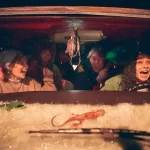Monday Movie: Red Hollywood, by David Bax
If the nearly three hours of Los Angeles Plays Itself wasn’t enough for you (and how could it be?), you’ll be pleased to know that you can get the same sort of kicks for another couple hours by checking out Thom Andersen’s 1996 film Red Hollywood, codirected by Noël Burch. The subject matter is different – this one looks at the work of blacklisted screenwriters, directors and actors – but the droll and clip-heavy tour through Hollywood history will be instantly recognizable to fans of Andersen’s magnum opus.
A leftist to the core, Andersen does not set out to prove that these men were unfairly accused of communism but that the mere notion that communism was a threat is itself unfair. Alternating between clips and contemporary interviews, Andersen and Burch illustrate how these filmmakers used their art to advocate for economic, social and racial equality.
Red Hollywood builds a strong case that the blacklist struck a blow against not only cinema put potentially the very conscience of the nation. But perhaps the film’s best argument for the upstanding decency of these persecuted artists comes in the use of a clip from Nicholas Ray’s 1954 Johnny Guitar (a film that has recently undergone a magnificent 4K restoration). Secretly written by the blacklisted Ben Maddow, the film features a scene in which a young bank robber falsly indicates a saloon owner as a co-conspirator after being promised a pardon for doing so. Maddow doesn’t demonize this man, despite his actions resembling that of the people who tarnished Maddow’s own name and life. In fact, the screenplay asks us to sympathize with the stool pigeon, directing its vitriol instead at the authoritarian forces (who hang the guy anyway). Whether you favor the left or the right in politics, it may be difficult not to be moved by that uncommon compassion for one’s own potential enemies. Of all Red Hollywood‘s successes, perhaps the most potent is this reminder that the blacklisted were not just members of a party or an ideology. They were people.































